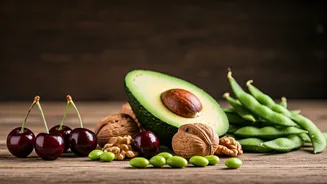Understanding Sleep Apnea
Sleep apnea is a common but serious sleep disorder characterized by pauses in breathing or shallow breaths while you sleep. These pauses, which can last
from a few seconds to minutes, occur multiple times during the night, reducing oxygen flow to the brain and other vital organs. The most common type is obstructive sleep apnea, which happens when throat muscles relax and block the airway. Central sleep apnea, less common, occurs when the brain doesn't send proper signals to the muscles that control breathing. Risk factors include obesity, older age, smoking, and family history. Recognizing symptoms like loud snoring, daytime sleepiness, and morning headaches is crucial for early diagnosis and effective management. Treatment often involves lifestyle changes, medical devices like CPAP machines, or, in some cases, surgery. Understanding the nature of this sleep disorder is the first step toward finding ways to cope with it.
Cherries: Sleep's Sweet Friend
Cherries, particularly tart cherries, are known for their high melatonin content, a hormone that regulates sleep-wake cycles. Melatonin helps the body prepare for sleep, making it easier to fall asleep and stay asleep. Regular consumption of cherries or cherry juice can potentially improve sleep quality and duration. Studies suggest that drinking tart cherry juice before bed may increase sleep time. This makes cherries a natural and delicious remedy for those struggling with sleep apnea. Incorporating cherries into your diet is simple; they can be eaten fresh, juiced, or added to smoothies. The benefits extend beyond just sleep; cherries are also rich in antioxidants, which reduce inflammation and improve overall health, supporting your body's ability to cope with sleep apnea symptoms. Remember to maintain a regular sleep schedule in addition to including cherries in your diet for improved sleep.
Avocados: Nutrients for Sleep
Avocados are packed with nutrients, including magnesium and healthy fats, which contribute to better sleep. Magnesium is vital for muscle relaxation and nerve function; it can help prevent the airway-blocking muscle relaxation that exacerbates sleep apnea. Healthy fats promote overall health, which includes sleep quality. Furthermore, the presence of vitamins and antioxidants in avocados can reduce inflammation, another factor that may affect sleep quality. Including avocados in your diet offers a versatile approach; they can be added to salads, smoothies, or eaten on their own. The healthy fats support hormonal balance, promoting restful sleep. It’s important to note that while avocados can contribute to better sleep, they are most effective when paired with other lifestyle changes, such as maintaining a consistent sleep schedule and avoiding caffeine and alcohol before bed. The nutrient-rich profile of avocados makes them a supportive addition to a sleep apnea management plan.
Walnuts: Melatonin's Boost
Walnuts are another natural source of melatonin, similar to cherries, making them beneficial for improving sleep. Regularly consuming walnuts can help regulate the sleep cycle, making it easier to fall asleep and stay asleep. The antioxidants in walnuts also contribute to reduced inflammation, which can indirectly aid in managing sleep apnea symptoms. Walnuts contain healthy fats and other essential nutrients supporting overall health, including better sleep. Integrating walnuts into your diet is simple; they can be added to salads, snacks, or breakfast cereals. Their convenient form makes them an easy addition. Pairing walnuts with other sleep-promoting foods can amplify the benefits. However, remember to consume walnuts in moderation, as they are calorie-dense. While not a standalone solution, incorporating walnuts can assist in creating a healthier sleep environment, potentially reducing some sleep apnea-related issues.
Soy: Promoting Restful Nights
Soy products, such as tofu and edamame, are a source of tryptophan, an amino acid the body uses to produce serotonin, which is then converted into melatonin. Melatonin plays a central role in regulating sleep. Consumption of soy products could improve sleep quality and help manage sleep apnea symptoms. Soy is also a good source of protein and other nutrients, aiding overall health and potentially reducing factors that can worsen sleep apnea. Including soy products in your diet is versatile; they can be incorporated into various meals. Soy can replace meat in some recipes or be a standalone snack. However, ensure that soy intake aligns with individual dietary needs and any related allergies or intolerances. For those who tolerate soy, it provides a valuable element in a sleep-supportive diet. The tryptophan content in soy makes it a beneficial addition to those working to combat the effects of sleep apnea.
Diet and Sleep: Practical Tips
Beyond including specific foods, consider how diet affects sleep. Eating a balanced diet rich in whole, unprocessed foods can greatly improve sleep quality. Limit processed foods, sugary drinks, and caffeine, especially close to bedtime. Maintain regular meal times to regulate your body's internal clock, which supports the sleep-wake cycle. Also, consider the timing of your meals; avoiding heavy meals close to bedtime can make it easier to fall asleep. Staying hydrated is also essential; drinking enough water throughout the day can support overall health and potentially influence sleep quality. Combine these dietary strategies with other healthy habits, like regular exercise and a consistent sleep schedule. Working with a healthcare provider can also help create a personalized plan to manage sleep apnea effectively. Remember, lifestyle adjustments and smart eating choices are key to better sleep and overall well-being.












